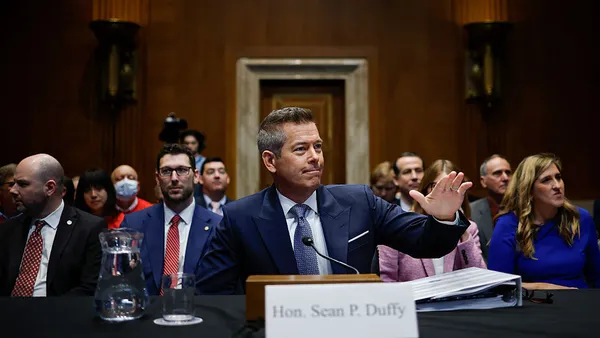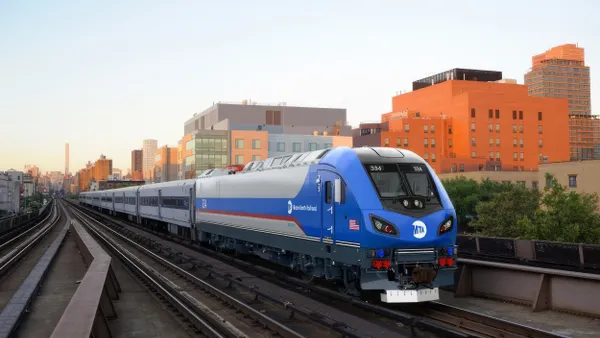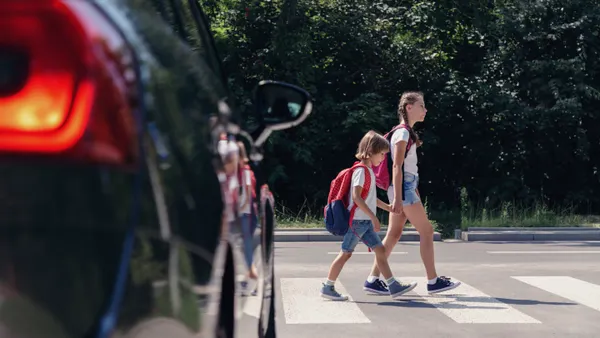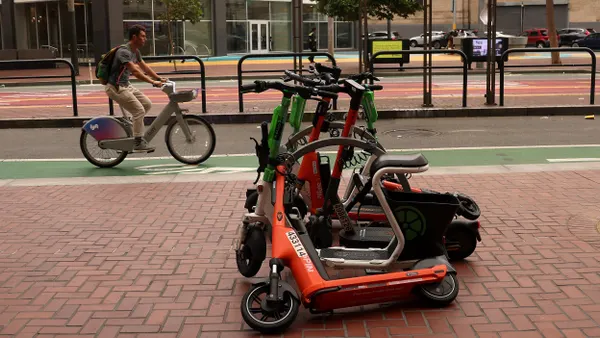UPDATE, June 2, 2020: Waymo's fleets of autonomous vehicles are returning to the Bay Area next week following a three-month hiatus due to COVID-19, The Verge reports. The company's vehicles will be used to deliver packages to two area nonprofits: Lighthouse for the Blind and Visually Impaired and #DrawTogether.
It is unclear how many Waymo drivers will return to work in the Bay Area for these deliveries. Waymo told Engadget it is taking "careful consideration" of current circumstances and focusing on employee health and safety as its "number one priority."
Dive Brief:
- Waymo relaunched its test fleets in the Metro Phoenix area on Monday, following a two-month suspension of its driving operations due to COVID-19.
- In a blog post, the company said it redesigned how employees use facilities; created new personal health and safety training; increased cleaning and disinfection; and adopted new health monitoring for workers, all to ensure employee wellbeing amid resumed operations.
- Waymo said it hopes to resume Waymo One ride-hailing services soon, and added it wants to assure riders that health and safety is their "number one priority as we begin driving again."
Dive Insight:
This reintroduction to operations is part of a "measured" approach from Waymo to put employees back to work while respecting measures to maintain social distancing. Waymo's other operations in cities including Los Angeles, San Francisco and Detroit will remain on hold until safety measures are relaxed further, at which time those cities will see a similarly-measured reintroduction of Waymo fleets.
Even in Phoenix, Waymo is toeing the limits of operations by relaunching test fleets before the state lifts its stay-at-home orders. One backup driver expressed apprehension of the relaunch in an interview with The Verge, stating that Waymo's safety measures are "above and beyond on paper," but Arizona has yet to see two full weeks of a decline in new COVID-19 cases.
Arizona Gov. Doug Ducey's full stay-at-home order is in effect through May 15, despite some legal efforts to block it, yet some businesses have been allowed to slowly reopen leading up to that date for "minimal-contact transactions," AZ Central reports. Ducey will reportedly give "frequent updates throughout the month of May" to aid residents in navigating the first steps of recovery.
Waymo's autonomous vehicle (AV) operations are not considered "essential," yet the trend of automation has been highlighted amid the pandemic as one that could make cities more resilient to future challenges, particularly health crises, due to the way it limits human interaction. The Jacksonville Transportation Authority (JTA) in Florida is one group that's using AVs in its pandemic response to transport COVID-19 tests from a drive-thru testing site to a nearby processing lab.
"With automation and thinking outside the box, we can solve a host of problems by not just sticking to the routine way of doing things," JTA CEO Nat Ford told Smart Cities Dive in an April interview.
It is likely transportation network companies (TNCs) like Uber and Lyft will see an uptick in ridership post-pandemic before public transit, as residents will take some time to become comfortable in crowded settings. An autonomous service like Waymo One could be a top choice of transportation for those especially vulnerable to lingering risks of infection, considering the vehicles' ability to limit human contact.
To keep up with all of our coverage on how the new coronavirus is impacting U.S. cities, visit our daily tracker.










